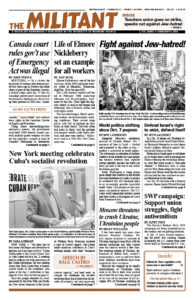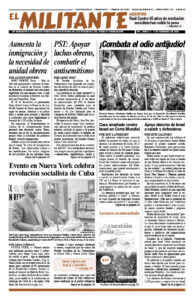It has been nearly two years since Russian President Vladimir Putin’s regime launched its invasion of Ukraine, hoping to seize Kyiv, kill the elected leadership and take control over the country within a few days. But working people of Ukraine, determined to defend their country’s independence, rose up and beat them back. Millions worldwide have been inspired by their resistance.
Moscow has stepped up its deadly bombardment of Ukrainian cities even as its forces have been pushed out of half the territory they occupied at the start of the invasion. It still occupies 18% of Ukraine, including all of Crimea, and, after initial successes, last year’s Ukrainian counteroffensive stalled.
Hundreds of thousands of Russian troops conscripted and sent to the front lines of these battles have been sent into battle as cannon fodder, poorly trained and killed or injured in large numbers. This has resulted in growing protests by mothers and wives of soldiers and others within Russia.
Despite all this, leading Russian government officials continue to threaten to crush the Ukrainian people unless they submit to Moscow’s dictates. Former Russian President Dmitry Medvedev posted a message on Telegram Jan. 17 making clear that Moscow’s goal remains the obliteration of Ukraine as a sovereign nation.
“The existence of Ukraine is fatally dangerous for Ukrainians,” he wrote. “They will understand that life [with Russia] in a large common state, which they do not want very much now, is better than death. Their deaths and the deaths of their loved ones. And the sooner Ukrainians realize this, the better.”
He added, “Whoever is at the helm of the cancerous new formation called Ukraine, it will not add legitimacy to his role or legal standing to the ‘country’ itself.”
But even Medvedev, who currently serves as Deputy Chairman of the Security Council of the Russian Federation, had to admit that this is not a very popular view among Ukrainians.
Ukrainian-language books banned in Luhansk
In the Russian-occupied areas of the Luhansk region in eastern Ukraine, the puppet government has banned all Ukrainian-language books and educational materials. All these materials are now banned from school libraries and will be destroyed. Moscow is replacing them with over 1.3 million Russian-language books of instruction and literature being sent to Luhansk.
The so-called Luhansk People’s Republic was established in 2014 after Kremlin-sponsored thugs, assisted by Russian troops, forced out Ukrainian authorities there. This occurred shortly after the victory won by working people in the mass, popular Maidan movement that overthrew the Russian-backed regime of Victor Yanukovych, advancing the fight for the country’s independence.
As a further insult, officials in the Russian oil-drilling city of Nefteuhansk, in west Siberia, have opened up a museum that focuses on personal belongings looted from Ukrainians living in areas occupied by Moscow. It includes Ukrainian military uniforms and equipment, as well as newspapers and children’s books in the Ukrainian language.
The purpose of the “museum,” according to the thieves who set it up, is to show that Ukrainians are really Russians.
Even in Crimea, which was occupied by Russian troops and annexed by Russia in 2014, Moscow has failed to crush expressions of support for Ukraine’s independence fight. At least 590 prosecutions have been brought against Crimeans, many of them indigenous Crimean Tatars, on charges of “discrediting” Russia’s armed forces by expressing pro-Ukrainian views, the Kharkiv Human Rights Protection Group reports.
These charges have been used to fine or imprison people “for playing/singing Ukrainian patriotic songs; displaying the Ukrainian flag or saying, ‘Glory to Ukraine.’”
These renewed threats of annihilation have been coupled with stepped-up missile and drone attacks aimed at civilians in cities across Ukraine, with increased casualties. In December, 100 were killed and nearly 500 injured, according to a Jan. 16 U.N. report.

